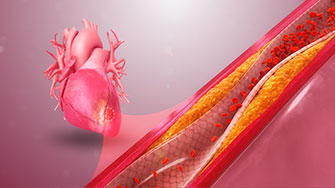
Coronary artery disease occurs when the coronary arteries become diseased or damaged due to the accumulation of plaques in the arteries (atherosclerosis). The coronary arteries are the main vessels that provide blood, oxygen and nutrients to the heart. Plaques are fatty deposits consisting of cholesterol and other cellular waste products. Build up of plaques narrow the coronary arteries, causing the heart to receive less blood.
Coronary artery disease can lead to heart attacks, heart failure and an abnormal heart rhythm (arrhythmia).
Coronary artery disease typically develops overtime, and can go unnoticed until a heart attack strikes. Symptoms of coronary artery disease include:
- Shortness of breath – If the heart cannot pump an adequate amount of blood to meet the needs of your body, you may experience shortness of breath or extreme exhaustion following physical exertion.
- Angina (chest pain) – Angina is a feeling of tightness or pressure in the chest. For some people, specifically women, angina may present itself as a sharp or brief pain in the back, arm or abdomen.
- Heart attack – If the coronary arteries are completely blocked, a heart attack may occur. You’re having a heart attack if you experience a crushing pressure in your chest, and pain in your arm or shoulder, sometimes accompanied by sweating and shortness of breath. In some cases, a heart attack can occur without any warning signs.
Risk Factors
The following factors put you at a higher risk for developing coronary artery disease:
- A family history of heart disease, especially if a close family member (father, brother, mother or sister) was diagnosed at an early age.
- Age – Getting older increases the possibility of damaged and narrowed arteries.
- Gender – Typically, men are much more likely to develop coronary artery disease. But, the risk for women increases following menopause.
- Smoking – Nicotine narrows blood vessels. Carbon monoxide can damage the inner lining of blood vessels, making them more prone to atherosclerosis.
- High Blood Pressure – High blood pressure that is not managed can cause the arteries to harden and thicken, thus narrowing the channel through which blood flows.
- High Blood Cholesterol – High cholesterol levels can increase the likelihood of plaques and atherosclerosis.
Diabetes, obesity, lack of exercise and high stress can also out you at a higher risk for developing coronary artery disease.
Treatment
Treatment for coronary artery disease consists of lifestyle changes, as well as drugs and medical procedures, if necessary.
Prevention
Lifestyle changes can also prevent or slow the advancement of coronary artery disease. These changes include exercising regularly, maintaining a healthy diet and weight, and finding ways to reduce stress. If you’re a smoker, kicking the habit is also a necessary lifestyle change.
In addition to lifestyle changes, be sure to regularly see your physician, especially if you have been diagnosed with diabetes, high blood pressure or high cholesterol.
All these solutions can put you on the road to better heart health for a lifetime.